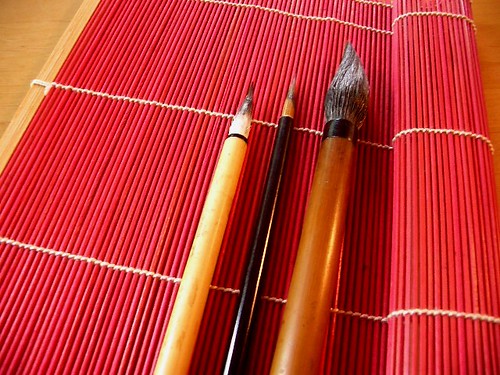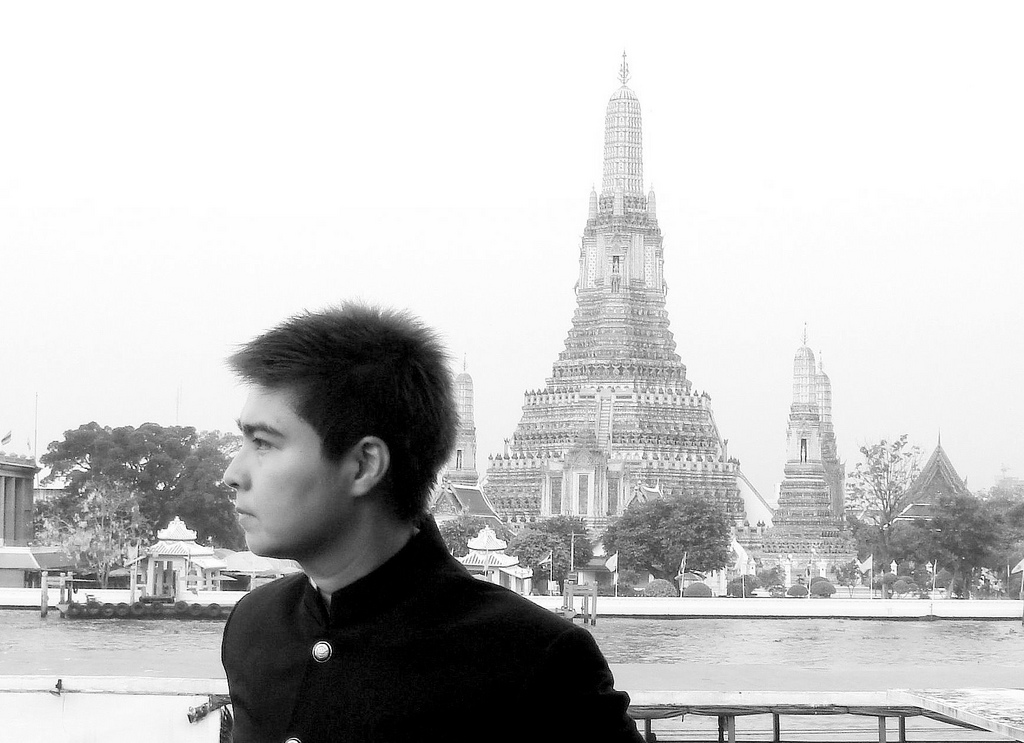
筆と筆巻き by Kanko
As appeared in BKK Post, Friday, Oct 3, 2008
It is Friday again and perhaps everyone's mind has already gone away for the weekend, far from the usual daily hustle and bustle.
Weekends, for working people at least, seem to be the only time that we normally devote to being connected with nature and with people close to us. It is time set aside to revitalise, to regain balance of body and mind, and to regain our sanity.
But, incredible though it may be, the very mundane, work-related activities we try so much to get away from could also deliver us similar benefits.
Take writing, for an example. It would not be too out of question to assume that we all have to engage in a written communication of some kind in our work. But, wait a minute. Written? Does anybody still write these days? Actual writing that involves a hand holding a writing instrument, scribbling on a piece of paper, that is.
In every culture there are moving tales of historic letters, diaries, memoirs, and even handwritten copies of literature. Surely we all must have pored over exhibits of that nature in museums all over the world, mesmerised not only by their contents, but also by the sheer humanity in the production of it all.
Many great leaders of the past are usually known for their passion for writing. Napoleon Bonaparte (1769-1821), top general and Emperor of France, had sent at least 33,000 letters during his lifetime. Toyotomi Hideyoshi (1537-1598), Japan's leading general who, later, like Napoleon, also became the country's de facto ruler, was known to have left tens of thousands of letters and other writings.
Even without seeing the original manuscripts, we could sense the power of these leaders' characters just by looking at the words they use. Napoleon used to write to inform the wife of a fallen soldier personally. Excerpts: "It is a dreadful moment when we are parted from the one we love. It shuts us off from the world. The body is convulsed with pain, and the faculties of the mind so overwhelmed that all its contacts with reality are cut off by a distorting dream."
Hideyoshi, whose literacy were much less fluent than Napoleon due to his humbler childhood, also tried his best and sent a handwritten sympathy note to a woman who lost both her son and grandson in a military campaign. Excerpts: "I would never presume to fathom the immeasurable grief you must feel at the simultaneous loss of your son and grandson. But from now on, I would be honoured if you would consider me, Hideyoshi, as your second son, however unworthy of that role I might be."
It is this very caring and sympathetic characteristic to their people that made these men the leaders they were. But beneath this obvious leadership quality, their writing reveals their humble side that is no different from ours - the ability to feel deep pain of self and that of others.
Besides the hand-to-hand thus heart-to-heart intimacy, handwritten material is valuable because it reminds us of the effort, patience, and concentration the author had to put into it. Many period movies have made a scene out of characters who, while trying to put their thoughts down by writing, kept crumbling up one piece of paper after another and throwing it away in distress.
Metaphorically speaking, by going through such experience ourselves, we would be reminded that, real life has no delete button nor cut and paste function. If we are not mindful enough in every stroke, we could create a mess out of ourselves.
Here is the very opportunity to rise above your normal self and approach life as a leader you have the potential to be. The conventional wisdom that we already know is that we should strive to write to people by hand occasionally to make them realise how much we value them. But here is a new twist - do write often to get to know yourself, to gain peace of mind, to acquire wisdom, and, seriously, to create your destiny!
The highly revered late Phra Acharn Chah was credited with the following most memorable lines:
"Watch your thoughts, for they become words.
Watch your words, for they become actions.
Watch your actions, for they become habits.
Watch your habits, for they become character.
Watch your character, for it becomes your destiny."
Writing by hand is probably one of the most mindful activities that we can have in our daily life. To create a meaningful message that also looks neat and pleasant, one needs to be mindful of both one's body and mind. Frankly, what activity could better let us have a clear penetration into our own thoughts than writing?
The smooth, rhythmic movement of writing itself serves as a very convenient tool for both types of meditative exercise: concentration and mindfulness. Try using different writing instruments and different kinds of writing surfaces and feel the difference it can cause to your mind. Go slow. Pause between sentences and look into your mind to contemplate what you really want to convey. Put down the pen/pencil/brush if need be and give yourself a long, complete, relaxed exhalation. Pick up the pen again only when your mind is ready. Try the long exhalation again before you begin writing.
You would probably be surprised that, by slowing down, not only you will have an opportunity to learn more about yourself and how your mind works, you will also be able to hold your initial anger or negative thinking in check. One reason we see so many angry messages on many web forums is because modern technology enables us to lash out the initial wave of negative thoughts at lightning speed without having the necessary time to contemplate our mind and thus restrain our behaviour. And, as we all know, it is only that very initial wave that is usually fatal. It is not just a wave, it is a furious, unforgiving tsunami! Don't let that initial wave swallow you up.
Imagine if those angry posters have to do it the old-fashioned Chinese/Japanese way - rubbing the ink stick on the ink stone, adding water, adjusting the ink's consistency, dipping the brush into the ink well, wiping excess ink on a piece of cloth, writing a few characters, then back to dipping, etc. Do you think there could be that many lengthy flamed messages on just about any topics on the internet?
Quite obviously, the comfort of the backspace and delete buttons as well as the cut-and-paste function has replaced the original purpose of deliberate, personal penmanship. It makes us forget how we as humans in our purest, simplest, truest form are supposed to be - capable of mistakes.
Therefore, let us put humanity back into our daily life by practicing more penmanship, and, in turn, mindfulness, for the benefits of all. Next time you whip out that post-it note, be mindful and put your heart into it. The person who receives it could feel it, whatever was in your mind. For those who do not have much opportunity to write to others, try keeping a diary. Running out of what to write? Copy your favourite prayer, poems, or other inspirational literature. Don't feel overwhelmed by the illusion that you have to write pages. Even a single line of anything that means something to you could be powerful if you really put your mind to it.
Like Phra Acharn Chah said, it all starts with your thoughts, which then translates into your words and your action. Before long, your writing would bring forth your chosen destiny. And, frankly, who would not want to take destiny in their own hands?







No comments:
Post a Comment